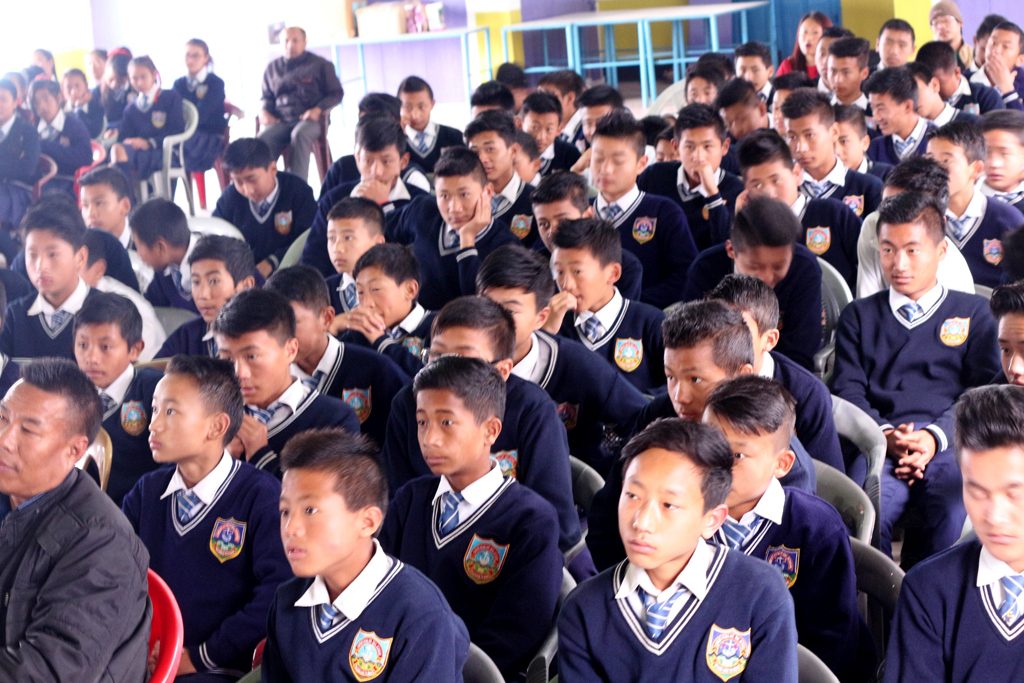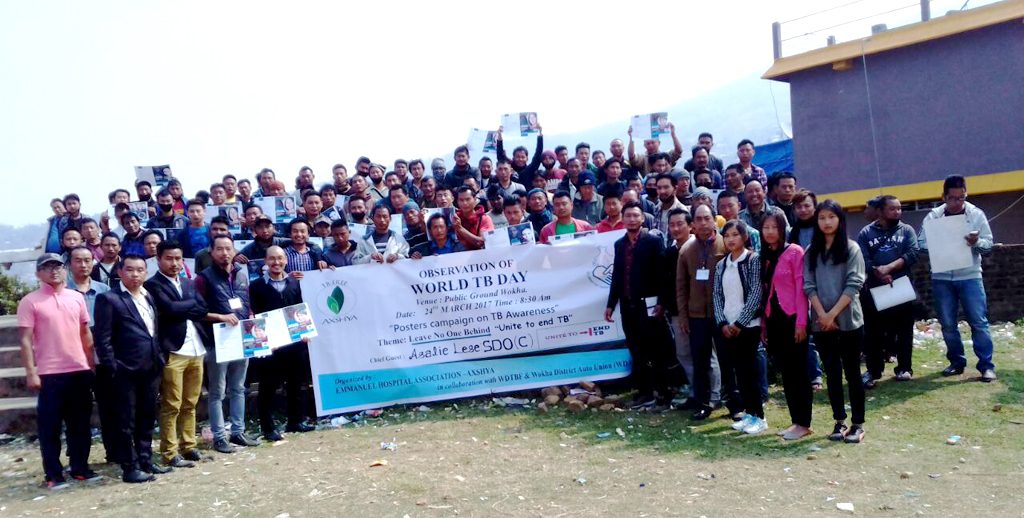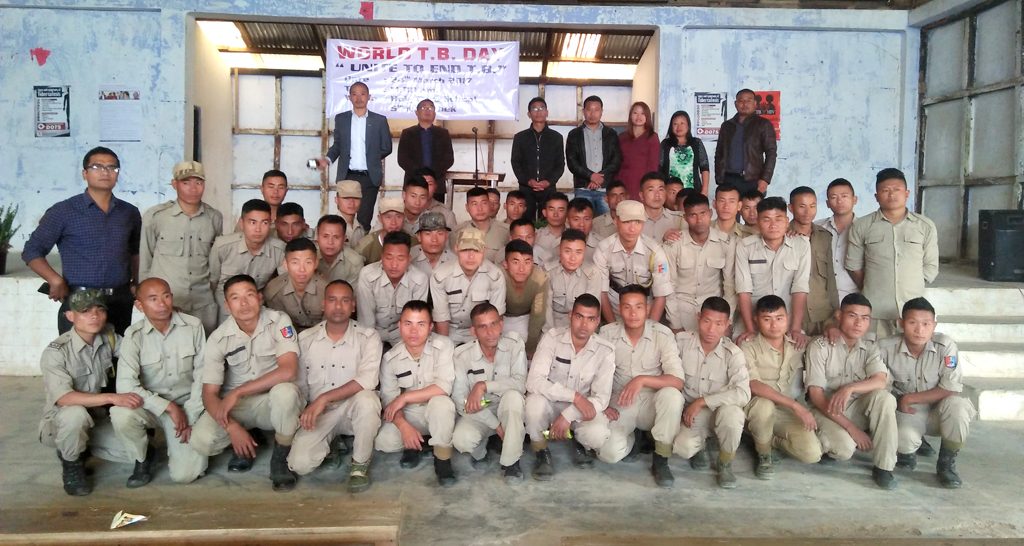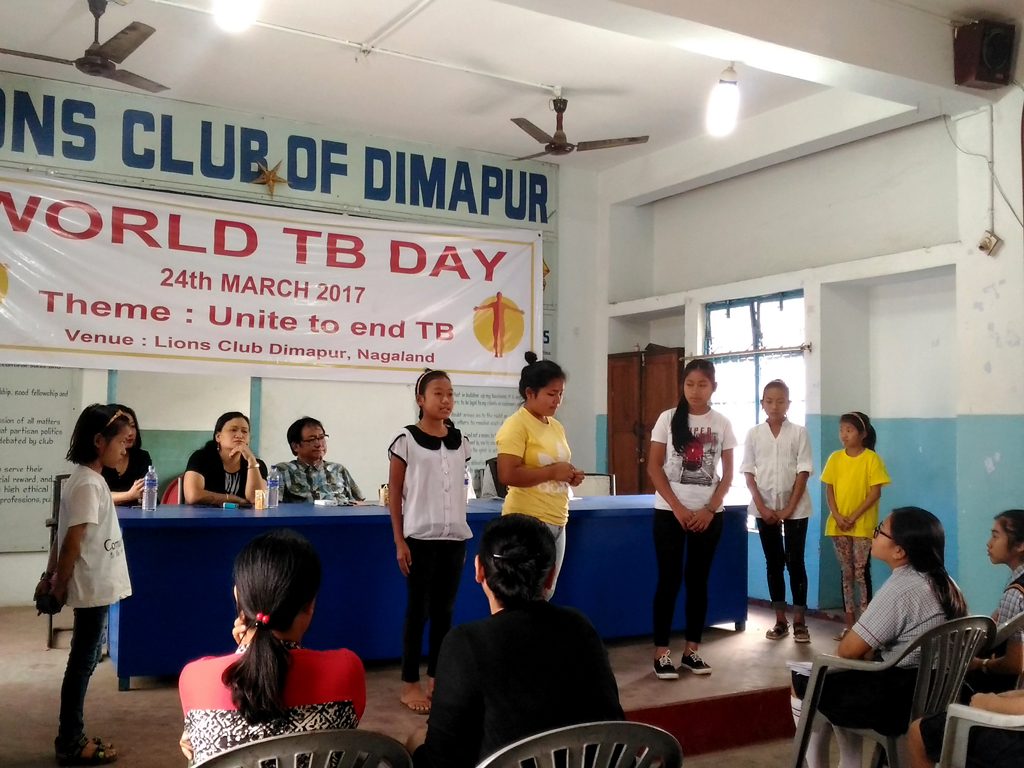Nagaland
Nagaland observes World Tuberculosis Day
Kohima, March 24 (EMN): Kohima town observed World Tuberculosis Day with the theme ‘Unite to End TB’ as a token of commitment to fighting the disease and to disseminate information in tackling issues related to tuberculosis.
The program was conducted on Friday at the Christ King Higher Secondary School in Kohima village. The event was organised by the Revised National TB Control programme (RNTCP) of the Health and Family Welfare Health department.

Addressing students of the institution, Nagaland TB Officer Dr K T Lotha said that tuberculosis was not a hereditary disease, but an airborne disease. To prevent the spread of the disease, he called for active support and involvement of all the sections of the society in educating the masses.
According Dr K T Lotha more than 40, 000 patients were reported to have been treated through the basic Directly Observed Treatment Short course chemotherapy (DOTS) since its launch in 2002.
Dr. Lotha observed that there were more chances for HIV-infected patients to develop TB. He pointed out through a PowerPoint presentation that “60% of HIV-infected patients have chances of developing TB in their lifetime. Undetected TB in people living with HIV shortens life. If you are HIV+ or think you may be HIV+, it is essential you get tested for TB.” This could save their lives, he said. “You can be cured of TB even if you are HIV positive.”
A new initiative was also launched this year called the 99DOTS to provide 99% of benefits of the DOTS at a fraction of the cost to patients.
‘The Anti-TB drugs are wrapped in envelopes which are printed with hidden numbers behind the pills. When patients dispense a dose, they reveal a hidden toll-free number which they call. This call gets reflected on our dashboard immediately as a taken dose,’ he notes.
In the concluding note, he said that TB was now treatable, preventable and curable. He encouraged the people to educate the people to avail treatment and diagnosis; they are available at all government health centres for free.
Dr. Potikokla Pongen, TB and HIV worker, also spoke during the event. In her address, she said World Tuberculosis Day is observed on March 24 every year to make people aware about the disease. The day also commemorates the lives and stories of people affected by tuberculosis and had been treated for it.
Tuberculosis day events provide a good opportunity to the people to be aware of the causes and the precautions to take against the disease. It mobilizes the political and social authorities to work toward prevention of the disease, and effective reduction in TB cases and death rate in the coming years.
Also, PPM coordinator Temjennochetla Ao said that the WHO aims to end Tuberculosis by 2035. The department is taking new strategies to solving the issue in Nagaland, she said. She has urged citizens to create awareness in eradicating the disease.
Sendenyu village, Kohima district
The Kohima district TB Control Society under the establishment of the Chief Medical Officer of Kohima observed World TB Day with community members of Sendenyu village on March 24. World TB Day is observed to generate public awareness and to mobilize political and social commitment toward eliminating tuberculosis as a public health burden.
District TB Officer of Kohima Dr. Asunu Sakhrie said during the event that in India `each year 2.2 million people develop TB and 220000 die from the disease.’ Saying that TB was completely curable with the right treatment, she appealed to the community to spread information about it.
Delivering the keynote address, Dr. Kezholenu Sakhrie, chest specialist at Naga Hospital Authority, said tuberculosis is an infectious disease and is spread through the air by a person suffering from TB. She elaborated the symptoms of the disease and said that suffering from the disease should not be a stigma as it can infect anyone. Instead, she said, seeking early diagnosis and treatment should be a priority as it can be completely cured if taken at the right dose and for the adequate amount of duration.
Further, Neiphrelie, supervisor at RNTCP, informed the participants about the benefits of DOTS and DOTS Plus treatments. The official informed them about the various facilities available for free including those for diagnosis and those for complete treatment. The villagers were urged to avail the services from the District Tuberculosis Centre at Kohima and at the Designated Microscopic Centers in the district.
Earlier, Accredited Social Health Activists of Sendenyu and Thongsunyu village, a former TB patient and the village’s council chairman and two Gaonburas were felicitated and given gift hampers as acknowledgement of their efforts against TB.
Also, students from Sendenyu government high school participated in an essay competition that was conducted with the theme ‘Unite to end TB.’ Students who wrote the best three essays were given prizes.
During the program, interactions were held with participants; questions regarding transmission, symptoms, and myths and misconceptions about the TB disease were clarified.
After the program, voluntary testing for HIV was conducted. General check up was also done on 30 patients by two doctors.
Wokha

Our Correspondent
The Wokha District TB Forum (WDTBF) observed World TB Day at the public ground of Wokha town in collaboration with the Wokha District Autorikshaw Union (WDAU), supported by a number of NGOs such as EJHA, AXSHYA.
Sub Division Officer (civil) of Wokha Asalie Lese was the chief guest of the occasion. In his address, Lese encouraged the public, especially the auto rickshaw drivers: the drivers can play an important role in spreading information about tuberculosis as they are in contact with passengers. The burden of TB is high in India, he said, ‘as the society has least awareness and there is high use of tobacco.’
The disease is curable unlike in the olden days, he said. Treatment is provided for free at government facilities, he added.
NGO member Robin Ezung highlighted various care and control measures for tuberculosis, Its diagnosis and treatment. Sulanthung Humtsoe, Wokha district co-ordinator at EHA-AXSHY highlighted the activities of EHA project AXSHY implementation in Wokha district.
Each year India has 22 lakh new cases and more than 3 lakh deaths related to TB.
The public is appealed to help in eradicating stigma and discrimination about TB and to participate in various health programs.
101 auto rickshaw drivers along with WDAU officials and others participated in the program.
World TB day, which falls on March 24 every year, commemorates the day when Dr. Robert Koch in 1882 announced to the scientific community that he had discovered the cause of tuberculosis, the TB bacillus.
Phek

The Revised National Tuberculosis Control Program Phek (RNTCP) in collaboration with the Emmanuel Hospital Association of Phek observed World Tuberculosis Day on March 24 at Holy Care School in Phek town.
District Tuberculosis Officer of Phek Dr. Ruokuohelie Rutsa was the resource person for the event. He spoke about the disease and its implications to the participants. Members of the school’s faculty, students of class-v to class-X attended the first session. Also, 52 soldiers from the 5th battalion of the Nagaland Armed Police in Phek attended in the second session.
In his address, Dr. Rutsa highlighted the causes and the symptoms of TB. He said that two million people are affected by TB in India every year; more than 2 lakh people die every year from the disease, he said. He added that people with HIV, diabetes; chronic smokers, alcoholics etc., among others, are at high risk of getting TB.
In commemoration of the event, a drawing competition was conducted for class II-v students. The first prize was begged by Ruyilu of class iv; the second prize went to I Vinaholi Chishi of class-v and the third went to Aselu of class-iv. Cash prizes were awarded to the winners; five consolation prizes were also given.
Leaflets on tuberculosis were handed out to all the participants at the event.
Tuensang
World TB Day was observed at the traffic point in Tuensang town on the 24th of March. The programme was organised by CHAI PROJECT AXSHYA in collaboration with IDS and RNTCP.
Highlights of the event included a silent march by students of schools namely Christ King School, Loyem Memorial School, Degree College and Akum Imlong School of Tuensang for mass public awareness about the disease.
Dr. Sungmo Chang, deputy chief medical officer, highlighted the symptoms and treatment for tuberculosis. She also talked about the stigma attached to TB patients. The official urged all the nongovernmental organisations and government departments to support the cause against TB in the district. TB is one of the deadliest killer diseases but it can be cured if treated on time, she added.
Debashish, principal of Loyem Memorial School, also spoke during the event. He said the TB advocacy by Chai project of AXSHYA reminded him of a school student who missed her dose and went to follow up her regular dose after attending the advocacy.
Nokshang Chang, president of the CKS, also expressed solidarity with TB patients who are fighting for their health and life. He urged the patients to complete the treatment without interruption as the ailment is curable and one can live a healthy life.
Dimapur

To commemorate World TB Day in the district along with the rest of the world, the RNTCP of Dimapur conducted World TB Day under the theme “ Unite to end TB” at Lions Club Dimapur on 24th March 2017.
Dr. Talitoba, DTO at RNTCP, talked to the participants about the signs and symptoms of TB and the diagnostic and treatment available free of cost at RNTCP TB Centre for the public. He also explained the danger of not completing the full course of TB medicine by patients as it leads to Multiple Drug Resistance. He informed the participants that TB is curable if diagnose on time and if patients strictly follow the full course of medications as prescribed.
Also, Dr. K. Vikato Kinimi, Chief Medical Officer of Dimapur, reiterated on the importance of timely detection and treatment of TB and further urged the students to spread the awareness on TB and maintaining a hygienic lifestyle.
NEISSR
On the 24th of March, the North East Institute of Social Science and Research (NEISSR) in Dimapur, commemorated World Tuberculosis Day with a programme with the theme “Unite to End TB” at the NEISSR conference hall.
Liangamang Robert, assistant professor, stressed on the role of social worker in creating awareness particularly at three levels. He said that at the administrative level, management measures that are intended to reduce the risk or exposure to persons with infectious TB.
Assigning someone the responsibility for TB infection control in the health care setting, conducting a TB risk assessment of the health setting, ensuring the availability of recommended laboratory processing, testing, and reporting of results etc can be some of the measure which can be taken up at the administrative level, he highlighted.
The second level of the hierarchy is the use of environmental controls to prevent the spread and reduce the concentration of infectious droplets through measures like controlling the source of infection by using local exhaust ventilation (e.g., hoods, tents, or booths), diluting and removing contaminated air by using general ventilation, controlling the airflow to preventing contamination of air in areas adjacent to the source airborne infection isolation; and cleaning the air by using high efficiency particulate air (HEPA) filtration.
He also spoke about the use of respiratory-protection control which consists of implementing a respiratory protection program, training health care workers on respiratory protection; and educating patients on respiratory hygiene and the importance of cough etiquette procedures.
The trainees also presented on the history behind the commemoration of the World TB day, causes, symptoms and preventive measures for T.B. Through the presentation, the trainee dispelled the myths that are usually associated with the understanding of how Tuberculosis is spread and can be treated.

